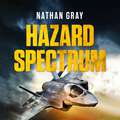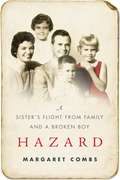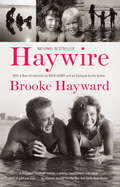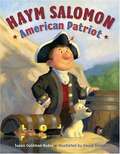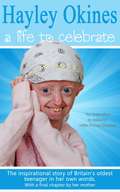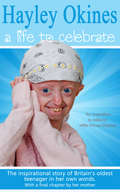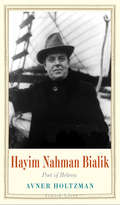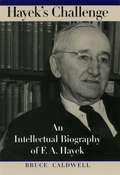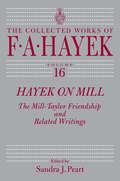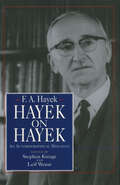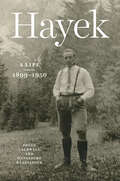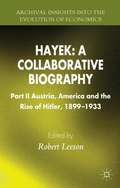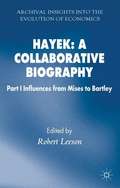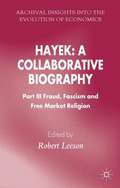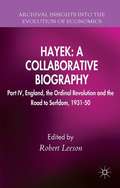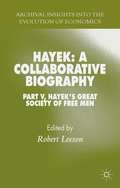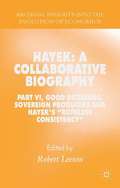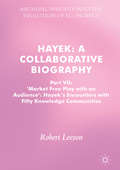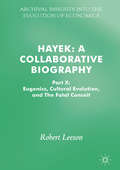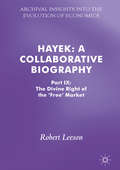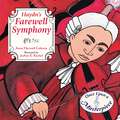- Table View
- List View
Hazard Spectrum: Life in The Danger Zone by the Fleet Air Arm’s Top Gun
by Nathan GrayOn 5 December 2002, trainee pilot Nathan Gray walked away from an 'unsurvivable' crash at RAF Wittering in Cambridgeshire. His instructor, seated behind him, was killed instantly. Despite the physical pain and mental scars, he found the strength and resilience to continue his flying career. Today Commander Nathan Gray is one of the UK's elite test pilots - the best of the best. Hazard Spectrum allows us to share Nathan's dizzying journey to the top of the Fleet Air Arm. With over 140 combat missions to his name, he is among the most decorated pilots in the British armed forces - our very own Maverick. In an exhilarating first-person narrative, Nathan takes us inside the cockpit as he holds Taliban fighters at bay in Afghanistan, and leads a top-secret mission to seek out Osama Bin Laden in the mountains of the Hindu Kush.In 2018, Nathan was chosen to complete the first take-off and landing of the world's most advanced fighter aircraft - the F35 stealth jet - on the flight deck of the flagship HMS Queen Elizabeth. A television audience of millions held its collective breath as he geared up for the task. This is the inspiring and unforgettable story of a man with a supreme ability to fly the most sophisticated and deadly planes ever created, who overcomes his personal demons to push the hazard spectrum to the limit - and beyond.'Nerve-shattering, enlightening and deeply moving' - JOHN NICHOL'A powerful and compelling read' - ROWLAND WHITE
Hazard: A Sister's Flight from Family and a Broken Boy
by Margaret CombsHazard is a poignant, unflinching memoir of the emotional intricacies of growing up with a severely disabled sibling. Margaret Combs shows how her Southern Baptist family coped with lived reality of autism in an era of ignorance and shame, the 1950s through the 1970s, and shares her own tragedy and anguish of being torn between helping her brother and yearning for her own life. Like many siblings of disabled children, young Margaret drives herself to excel in order to make up for her family’s sorrow and ultimately flees her family for what she hopes is a ?normal” life.Hazard is also a story of indelible bonds between siblings: the one between Combs and her sister, and the deep and rueful one she has with her disabled brother; how he and she were buddies; and how fervently she wanted to make him whole. Initially fueled by a wish that her brother had never been born, the author eventually arrives in a deeper place of gratitude for this same brother, whom she loves and who loves her in return.
Haywire
by Brooke HaywardFrom the moment of its publication in 1977, Haywire was a national sensation and a #1 bestseller, a celebrated Hollywood memoir of a glittering family and the stunning darkness that lurked just beneath the surface. Brooke Hayward was born into the most enviable of circumstances. The daughter of a famous actress and a successful Hollywood agent, she was beautiful, wealthy, and living at the very center of the most privileged life America had to offer. Yet at twenty-three her family was ripped apart. Who could have imagined that this magical life could shatter, so conclusively, so destructively? Brooke Hayward tells the riveting story of how her family went haywire.From the Trade Paperback edition.
Haym Salomon: American Patriot
by Susan Goldman Rubin David Slonim<p>"The story of one of Americas first true patriots" <p>Everyone knows Revolutionary War figures George Washington, Benjamin Franklin, and Paul Revere, but Haym Salomon was also an important hero, and his accomplishments are finally gaining recognition in this biography that will entertain as it introduces its unique subject. Haym was one of the few Jewish patriots of the time. His knowledge of languages and currencies made him an exceptional man in pre-Revolution New York. <p>Incredibly valuable to the revolutionary cause, Haym risked his life and his fortune, went to prison, and was forced to abandon his home and family all for the sake of American independence. <p>Acclaimed author Susan Goldman Rubin, along with illustrator David Slonim, brings Hayms remarkable story to life.</p>
Hayley Westenra: In Her Own Voice
by Darren Henley Hayley WestenraHayley's first performance as 'Little Star' in a Christmas play was perfectly pitched, beautifully sung and enthusiastically received. She was six years old. Now, at the tender age of twenty, she is the fastest-selling debut classical artist ever. Her string of musical accolades is astonishing and her audiences range from royalty to premiers.This is her story, from her first performance, through later roles in major productions such as Annie, La Bohème and The Sound of Music, her decision at the age of eleven to busk for her lunch money, and the subsequent record deals, money, charity work and classical superstardom.
Hayley Okines - A Life to Celebrate
by Hayley OkinesHayley Okines was just like any other teenager: she loved clothes, shopping, and boy bands, and hated getting up in the morning. But she had progeria, which meant she aged eight times faster than normal, giving her the body of a 126-year-old. Her positive attitude and infectious smile charmed millions of people through her Extraordinary People TV documentaries. At the age of seventeen, in April 2015, Hayley tragically lost her battle to be the longest survivor of progeria, succumbing to pneumonia in the arms of her mother. This book tells Hayley's story in her own words, continuing from the bestselling Old Before My Time. She reflects on the pains and perks of growing up with progeria - from the heartbreak of being told she will never walk again to the delight of passing her exams and starting college. Hayley considers mood swings, marriage, music, and what it's like to be 'famous' and is heartbreakingly positive about a future that wasn't to be.
Hayley Okines - A Life to Celebrate
by Hayley OkinesHayley Okines was just like any other teenager: she loved clothes, shopping, and boy bands, and hated getting up in the morning. But she had progeria, which meant she aged eight times faster than normal, giving her the body of a 126-year-old. Her positive attitude and infectious smile charmed millions of people through her Extraordinary People TV documentaries.At the age of seventeen, in April 2015, Hayley tragically lost her battle to be the longest survivor of progeria, succumbing to pneumonia in the arms of her mother. This book tells Hayley’s story in her own words, continuing from the bestselling Old Before My Time. She reflects on the pains and perks of growing up with progeria – from the heartbreak of being told she will never walk again to the delight of passing her exams and starting college. Hayley considers mood swings, marriage, music, and what it’s like to be ‘famous’ and is heartbreakingly positive about a future that wasn’t to be.
Hayley Okines - A Life to Celebrate
by Hayley OkinesHayley Okines was just like any other teenager: she loved clothes, shopping, and boy bands, and hated getting up in the morning. But she had progeria, which meant she aged eight times faster than normal, giving her the body of a 126-year-old. Her positive attitude and infectious smile charmed millions of people through her Extraordinary People TV documentaries.At the age of seventeen, in April 2015, Hayley tragically lost her battle to be the longest survivor of progeria, succumbing to pneumonia in the arms of her mother. This book tells Hayley’s story in her own words, continuing from the bestselling Old Before My Time. She reflects on the pains and perks of growing up with progeria – from the heartbreak of being told she will never walk again to the delight of passing her exams and starting college. Hayley considers mood swings, marriage, music, and what it’s like to be ‘famous’ and is heartbreakingly positive about a future that wasn’t to be.
Hayley Okines: A Life to Celebrate
by Hayley Okines Kerry Okines Alison StokesHayley Okines was just like any other teenager: she loved clothes, shopping, and boy bands, and hated getting up in the morning. But she had progeria, which meant she aged eight times faster than normal, giving her the body of a 126-year-old. Her positive attitude and infectious smile charmed millions of people through her Extraordinary People TV documentaries. At the age of seventeen, in April 2015, Hayley tragically lost her battle to be the longest survivor of progeria, succumbing to pneumonia in the arms of her mother. This book tells Hayley's story in her own words, continuing from the bestselling Old Before My Time. She reflects on the pains and perks of growing up with progeria - from the heartbreak of being told she will never walk again to the delight of passing her exams and starting college. Hayley considers mood swings, marriage, music, and what it's like to be 'famous' and is heartbreakingly positive about a future that wasn't to be.
Hayim Nahman Bialik: Poet of Hebrew (Jewish Lives)
by Prof. Avner HoltzmanA moving inquiry into the dramatic life, epic success, and ultimate tragedy of the great Hebrew poet By the time he was twenty-eight, Hayim Nahman Bialik was already considered the National Hebrew Poet. He had only published a single collection, but his deeply personal poetry established a profound link between the secular and the traditional that would become paramount to a national Jewish identity in the twentieth century. When he died unexpectedly in 1934, the outpouring of grief was unprecedented, confirming him as a father figure for the Zionist movement in Palestine, and around the world. Using extensive research and elegant readings of Bialik's poems, Avner Holtzman investigates the poet's dramatic life, complex personality, beloved verse, and continued popularity. This clear-eyed and thorough biography explores how Bialik overcame intense personal struggles to become a charismatic literary leader at the core of modern Hebrew culture.
Hayek's Challenge: An Intellectual Biography of F.A. Hayek
by Bruce CaldwellFriedrich A. Hayek is regarded as one of the preeminent economic theorists of the twentieth century, as much for his work outside of economics as for his work within it. During a career spanning several decades, he made contributions in fields as diverse as psychology, political philosophy, the history of ideas, and the methodology of the social sciences. Bruce Caldwell—editor of The Collected Works of F. A. Hayek—understands Hayek's thought like few others, and with this book he offers us the first full intellectual biography of this pivotal social theorist. Caldwell begins by providing the necessary background for understanding Hayek's thought, tracing the emergence, in fin-de-siècle Vienna, of the Austrian school of economics—a distinctive analysis forged in the midst of contending schools of thought. In the second part of the book, Caldwell follows the path by which Hayek, beginning from the standard Austrian assumptions, gradually developed his unique perspective on not only economics but a broad range of social phenomena. In the third part, Caldwell offers both an assessment of Hayek's arguments and, in an epilogue, an insightful estimation of how Hayek's insights can help us to clarify and reexamine changes in the field of economics during the twentieth century. As Hayek's ideas matured, he became increasingly critical of developments within mainstream economics: his works grew increasingly contrarian and evolved in striking—and sometimes seemingly contradictory—ways. Caldwell is ideally suited to explain the complex evolution of Hayek's thought, and his analysis here is nothing short of brilliant, impressively situating Hayek in a broader intellectual context, unpacking the often difficult turns in his thinking, and showing how his economic ideas came to inform his ideas on the other social sciences.Hayek's Challenge will be received as one of the most important works published on this thinker in recent decades.
Hayek on Mill: The Mill-Taylor Friendship and Related Writings (The Collected Works of F. A. Hayek #16)
by Friedrich A. Hayek Sandra J. Peart edited by Sandra J. PeartBest known for reviving the tradition of classical liberalism, F. A. Hayek was also a prominent scholar of the philosopher John Stuart Mill. One of his greatest undertakings was a collection of Mill's extensive correspondence with his longstanding friend and later companion and wife, Harriet Taylor-Mill. Hayek first published the Mill-Taylor correspondence in 1951, and his edition soon became required reading for any study of the nineteenth-century foundations of liberalism. This latest addition to the University of Chicago Press's Collected Works of F. A. Hayek series showcases the fascinating intersections between two of the most prominent thinkers from two successive centuries. Hayek situates Mill within the complex social and intellectual milieu of nineteenth-century Europe-as well as within twentieth-century debates on socialism and planning-and uncovers the influence of Taylor-Mill on Mill's political economy. The volume features the Mill-Taylor correspondence and brings together for the first time Hayek's related writings, which were widely credited with beginning a new era of Mill scholarship.
Hayek on Hayek: An Autobiographical Dialogue ( The Collected Works of F. A. Hayek)
by F. A. Hayek Stephen Kresge Leif WenarThe crumbling of the Berlin Wall, the fall of the iron curtain, and the Reagan and Thatcher "revolutions" all owe a tremendous debt to F. A. Hayek. Economist, social and political theorist, and intellectual historian, Hayek passionately championed individual liberty and condemned the dangers of state control. Now Hayek at last tells the story of his long and controversial career, during which his fortunes rose, fell, and finally rose again. <P><P> Through a complete collection of previously unpublished autobiographical sketches and a wide selection of interviews, Hayek on Hayek provides the first detailed chronology of Hayek's early life and education, his intellectual progress, and the academic and public reception of his ideas. His discussions range from economic methodology and the question of religious faith to the atmosphere of post-World War I Vienna and the British character. <P><P> Born in 1899 into a Viennese family of academics and civil servants, Hayek was educated at the University of Vienna, fought in the Great War, and later moved to London, where, as he watched liberty vanish under fascism and communism across Europe, he wrote The Road to Serfdom. Although this book attracted great public attention, Hayek was ignored by other economists for thirty years after World War II, when European social democracies boomed and Keynesianism became the dominant intellectual force. However, the award of the Nobel Prize in economics for 1974 signaled a reversal in Hayek's fortunes, and before his death in 1992 he saw his life's work vindicated in the collapse of the planned economies of Eastern Europe. <P><P> Hayek on Hayek is as close to an autobiography of Hayek as we will ever have. In his own eloquent words, Hayek reveals the remarkable life of a revolutionary thinker in revolutionary times. <P><P> "One of the great thinkers of our age who explored the promise and contours of liberty....[Hayek] revolutionized the world's intellectual and political life"—President George Bush, on awarding F. A. Hayek the Medal of Freedom <P><P> F. A. Hayek, recipient of the Medal of Freedom 1991 and the Nobel Memorial Prize in Economics in 1974, was a pioneer in monetary theory and the principal proponent of the libertarian philosophy. Hayek is the author of numerous books in economics, as well as books in political philosophy and psychology.
Hayek: A Life, 1899–1950 (The\collected Works Of F. A. Hayek Ser.)
by Bruce Caldwell Hansjoerg KlausingerA 2022 Economist Best Book of the Year. The definitive account of the distinguished economist’s formative years. Few twentieth-century figures have been lionized and vilified in such equal measure as Friedrich Hayek—economist, social theorist, leader of the Austrian school of economics, and champion of classical liberalism. Hayek’s erudite arguments in support of individualism and the market economy have attracted a devout following, including many at the levers of power in business and government. Critics, meanwhile, cast Hayek as the intellectual forefather of “neoliberalism” and of all the evils they associate with that pernicious doctrine. In Hayek: A Life, historians of economics Bruce Caldwell and Hansjörg Klausinger draw on never-before-seen archival and family material to produce an authoritative account of the influential economist’s first five decades. This includes portrayals of his early career in Vienna; his relationships in London and Cambridge; his family disputes; and definitive accounts of the creation of The Road to Serfdom and of the founding meeting of the Mont Pèlerin Society. A landmark work of history and biography, Hayek: A Life is a major contribution both to our cultural accounting of a towering figure and to intellectual history itself.
Hayek: Part II Austria, America and the Rise of Hitler, 1899- 1933 (Archival Insights Into the Evolution of Economics)
by Robert LeesonA group of leading scholars from around the world use archival material alongside Hayek's published work to bring a new perspective on the life and times of one the 20th Century's most influential economists. This much awaited second volume details the life of Hayek from 1899 to1933 covering Hayek's time in Austria and the USA.
Hayek: Part I Influences from Mises to Bartley (Archival Insights Into the Evolution of Economics)
by Robert LeesonThis is the first collaborative biography of Hayek. Some of the world's most distinguished scholars will integrate the archival evidence with Hayek's published writings to illuminate the process by which Hayek changed the direction of world history.
Hayek: Part III Fraud, Fascism and Free Market Religion (Archival Insights Into the Evolution of Economics)
by Robert LeesonIn 1984, F. A. Hayek, the co-leader of the Austrian free market neo-classical school, embraced the transparently fraudulent assertion made by Donald McCormick, aka Richard Deacon, in The British Connection (1979) which accused A. C. Pigou, the co-leader of the Cambridge market failure neo-classical school, of being a Soviet spy. Over lunch at the Reform Club with 'Deacon' McCormick, the former Sunday Times Foreign Manager, Hayek authenticated the fraudulent signature contained in a 1905 diary the essence of the case against Pigou. In this third volume of Hayek: A Collaborative Biography, a distinguished collection of academics and specialists examine 'Deacon' McCormick's fraudulent career: summarizing the large volume of incriminating evidence that was available to Hayek in 1984. Hayek's 1931 unsubstantiated assertion about having predicted the Great Depression was obviously matched by other equally unreliable assertions. That Hayek's assertions have been uncritically repeated by his disciples illuminates dynamics of that school. Austrian School economists who promote financial sector deregulation and climate change denial appear to resemble a free market religion rather than the scientific communities examined in other volumes in this series. "
Hayek: Part IV, England, the Ordinal Revolution and the Road to Serfdom, 1931- 50 (Archival Insights Into the Evolution of Economics)
by Robert LeesonThe study encompasses historical, social, political and economic viewpoints in examining Hayek's life and the history of economic thought. In the early 1930s, Hayek's business cycle work was apparently defeated by John Maynard Keynes and Piero Sraffa. However, Hayek had three successes. The Ordinal revolution, which undermined the foundations of welfare economics, was successfully transplanted from pre-war Austria and Lausanne to inter-war Britain. The Road to Serfdom (1944) attributed blame for Hitler not on those who funded him (the business sector) but on those who opposed him (socialists). In 1947, Hayek also launched the highly influential Mont Pelerin Society. Hayek had to diplomatically navigate around the other branch of the Austrian School (as represented by Ludwig Mises) whilst maintaining support from members of the nascent Chicago School. As an atheist Hayek had to compromise: the Society would not be named after two Roman Catholic aristocrats (The Acton de Tocqueville Society), but what later became known as the 'religious right' was, nevertheless, accommodated.
Hayek: Part V, Hayek's Great Society of Free Men (Archival Insights Into the Evolution of Economics)
by Robert LeesonThis fifth biographical volume examines the hypothesis that Hayek's promotion of the Great Society of Free Men was consistent with his behavioural postulate: amoral self-interest. His Constitution of Liberty promoted those with inter-generational entitlements as the true defenders of 'civilisation' and 'property' - an Austrian School of Economics vision of society dominated by the wealthy. According to Hayek, labour unions were enemies of his 'spontaneous' order: yet unions evolved spontaneously. This archival series also provides an opportunity for reflection, correction and elaboration: two chapters responses to material contained in Part I of Hayek: A Collaborative Biography. <P><P>F.A. von Hayek (1899-1992), who's Nobel Prize for Economic Sciences appears to have been awarded, in part, for a job-interview assertion for which – after eight decades – no evidence has emerged, was famous for promoting the Austrian version of classical liberalism.
Hayek: Part VI, Good Dictators, Sovereign Producers and Hayek's "Ruthless Consistency" (Archival Insights Into The Evolution of Economics)
by Robert LeesonIn this sixth volume contributors examine Hayek's neoliberal economics and politics in the 20th century, and the demise of the socialist system. Taking a closer look at Hayek's time in Australia, and his time spent travelling in the east.
Hayek: Part VII, 'Market Free Play with an Audience': Hayek's Encounters with Fifty Knowledge Communities (Archival Insights into the Evolution of Economics)
by Robert LeesonThis book is the seventh volume in this series which explores the life of Nobel Price-winning economist F.A. Hayek (1899-1992). The volume uses archival material, juxtaposed with Hayek’s published work to challenge the existing perceptions of his life and thought. It examines the methods by which Hayek interacted with – and schemed against – the knowledge communities that he encountered during his very long life. Chapters explore the ‘rules of engagement’ that Hayek employed when interacting with fifth leading knowledge communities, including the Nobel Prize selection committee who were led to believe his claim about having predicted the Great Depression. It also explores his interactions with William Beveridge, the founder of the modern British Welfare State, A. C. Pigou, the founder of the market school, J. M. Keynes, Sir Arthur Lewis, and Abba Lerner.
Hayek: Part X: Eugenics, Cultural Evolution, and The Fatal Conceit (Archival Insights into the Evolution of Economics)
by Robert LeesonThis tenth part of Robert Leeson's collaborative biography of Friedrich August von Hayek explores Hayek’s thought on the free market and democracy. Using an unparalleled array of archival materials, Leeson reconstructs Hayek’s thinking as the notorious economist and his acolytes set about reshaping the post-war economic order. Darker areas of Hayek’s thought are also explored, including the influence of eugenics on his thought and his support for radical right-wing dictatorships in South America. <P><P> Leeson concludes this volume with a collection of chapters written by eminent scholars of Hayek. These chapters cover subjects as diverse as Hayek’s influence on scholars of Darwinian evolution, his views on psychology, and cultural evolution.
Hayek: Part IX: The Divine Right of the 'Free' Market (Archival Insights into the Evolution of Economics)
by Robert LeesonIn 1984, F. A. Hayek, the co-leader of the Austrian free market neo-classical school, embraced the transparently fraudulent assertion made by Donald McCormick, aka Richard Deacon, in The British Connection (1979) which accused A. C. Pigou, the co-leader of the Cambridge market failure neo-classical school, of being a Soviet spy. Over lunch at the Reform Club with 'Deacon' McCormick, the former Sunday Times Foreign Manager, Hayek authenticated the fraudulent signature contained in a 1905 diary the essence of the case against Pigou. In this third volume of Hayek: A Collaborative Biography, a distinguished collection of academics and specialists examine 'Deacon' McCormick's fraudulent career: summarizing the large volume of incriminating evidence that was available to Hayek in 1984. Hayek's 1931 unsubstantiated assertion about having predicted the Great Depression was obviously matched by other equally unreliable assertions. That Hayek's assertions have been uncritically repeated by his disciples illuminates dynamics of that school. Austrian School economists who promote financial sector deregulation and climate change denial appear to resemble a free market religion rather than the scientific communities examined in other volumes in this series. "
Haydn's Farewell Symphony (Once Upon a Masterpiece #1)
by Anna Harwell CelenzaAnna Harwell Celenza's engaging fictionalized telling of the story behind Franz Joseph Haydn's famous symphony is a perfect introduction to classical music and its power. THE FAREWELL SYMPHONY brings to life a long summer spent at Esterháza, the summer palace of Prince Nicholas of Esterházy.The blustering, bellowing prince entertained hundreds of guests at his rural retreat and demanded music for every occasion. As the months passed, Haydn was kept very busy writing and performing music for parties, balls, dinners, and even walks in the gardens. His orchestra members became homesick and missed their families. The anger, frustration, and longing of the musicians is expressed beautifully in the symphony born of the clever mind of Joseph Haydn who used it to convince Prince Nicholas that it was time to go home.Wonderfully expressive illustrations by JoAnn E. Kitchel capture all the comedy and pathos of this unique symphony. Beautifully interpretive motifs and borders convey the setting and emotion of the story mirroring the structure of the symphony with the repetitive use of sets of four. Making classical music and history come alive with color and character, THE FAREWELL SYMPHONY ensures a place for the arts in the hearts and minds of children.
